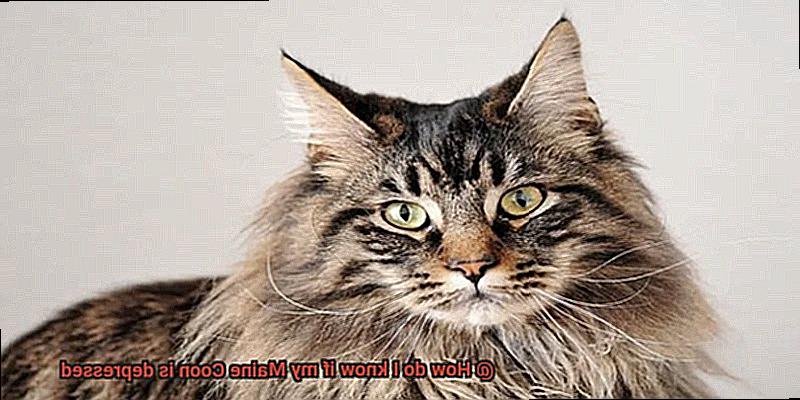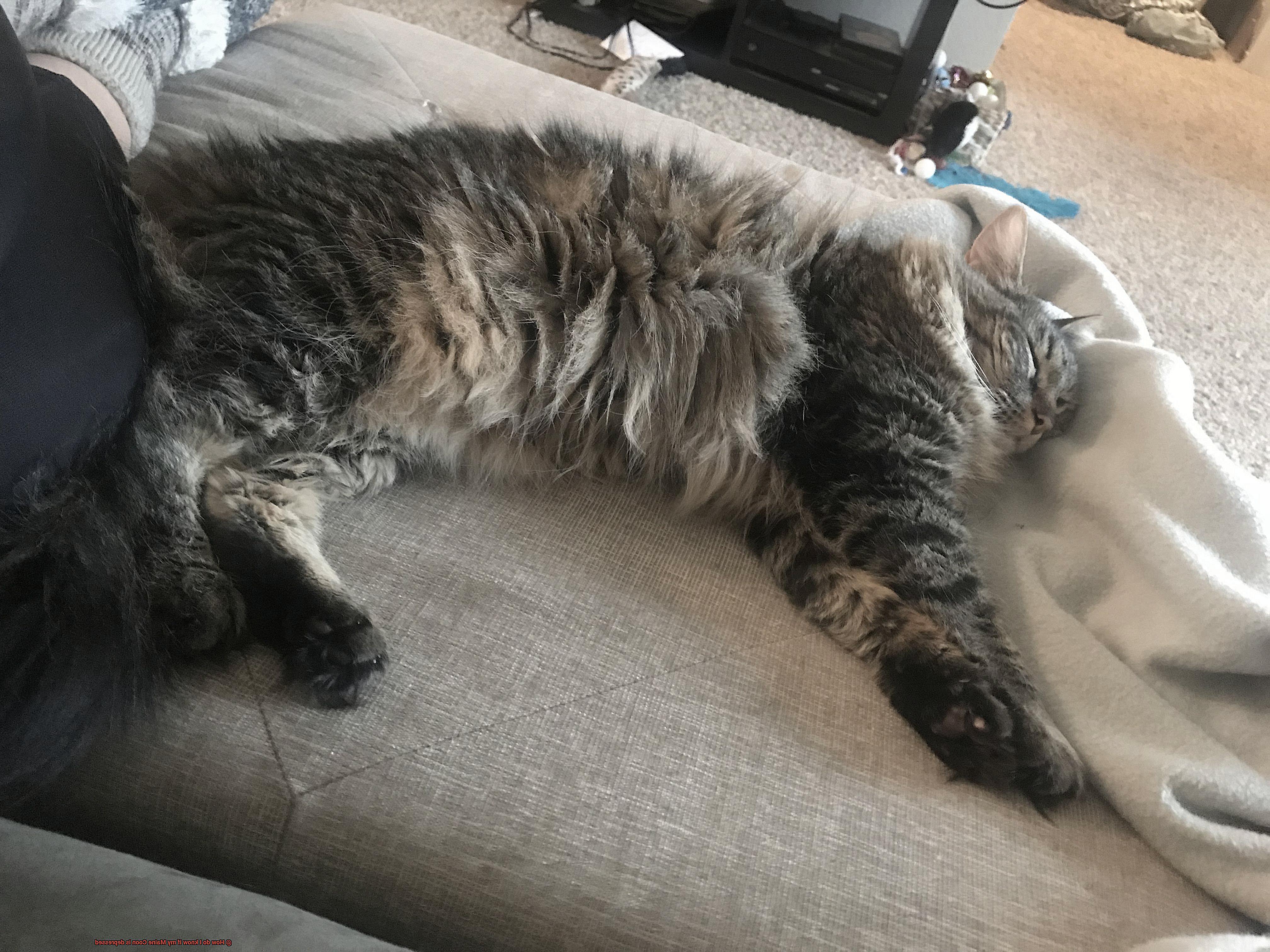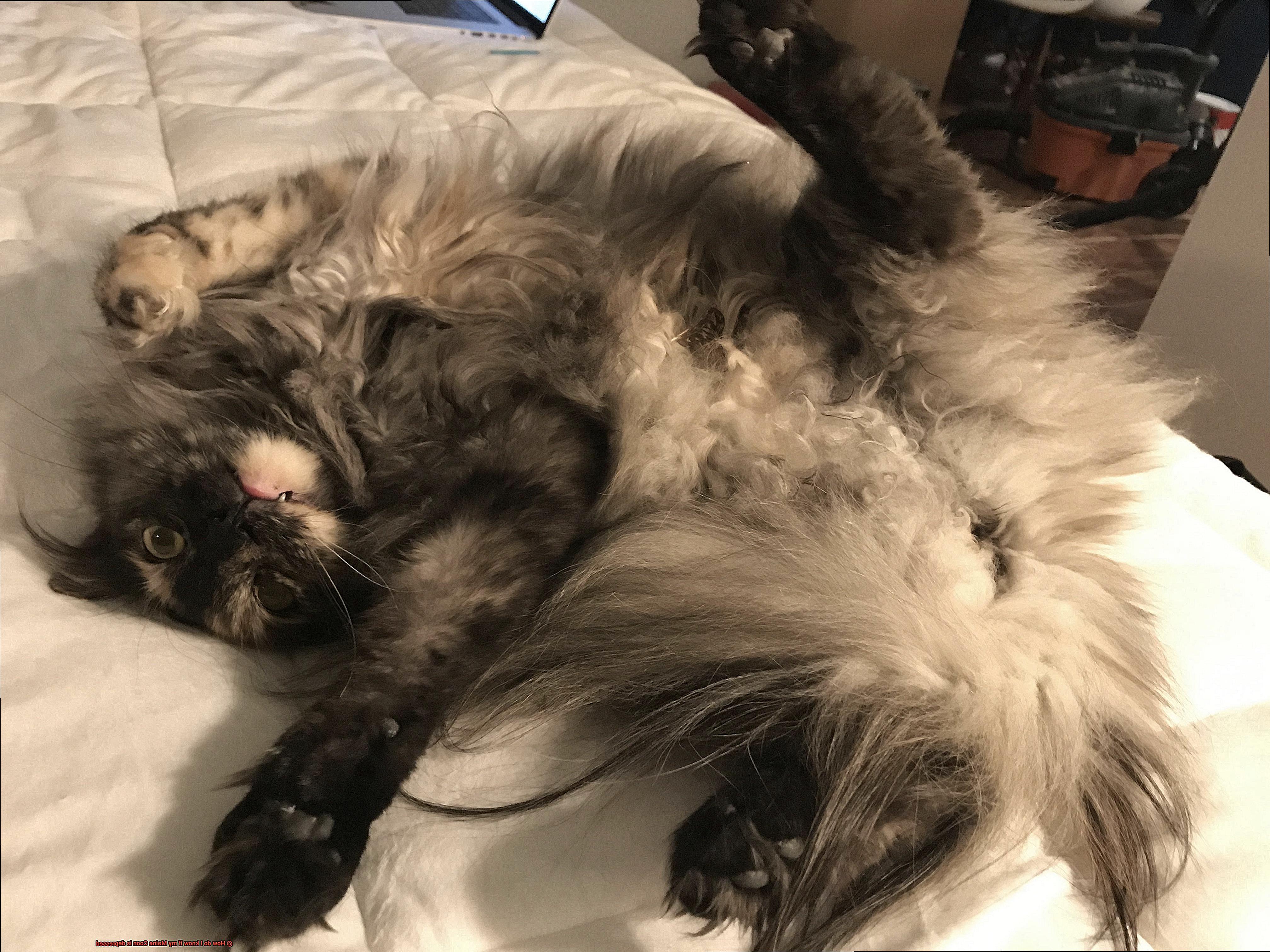Maine Coons are truly remarkable creatures, with their striking looks, intelligent minds, and affectionate nature. As a proud owner of one of these majestic felines, you know how much joy they bring into your life with their playful antics and constant need for attention. However, what happens when your furry friend starts to act differently? Could it be that they’re feeling down and depressed?
Depression in cats is a growing concern among pet owners, and Maine Coons are no exception. They have a sensitive disposition that makes them more susceptible to developing mental health issues. While depression in cats is not very common, it’s crucial to spot the signs early on to prevent further deterioration.
In this blog post, we’ll explore the subtle and not-so-subtle clues that indicate your Maine Coon might be struggling emotionally. From changes in eating habits to hiding away or displaying unusual aggression, we’ll cover everything you need to know to identify if your cat is depressed.
So let’s dive in and learn how to read your feline friend’s behavior better so that you can provide them with the emotional support they need during this challenging time.
What is Depression in Maine Coons?
Maine Coon cats are renowned for their playful and energetic nature. However, like their human counterparts, they can also experience periods of depression. As a responsible pet owner, it’s important to be aware of the signs and symptoms of depression in your feline friend and provide the support they need to overcome this condition.
One of the most telling signs of depression in Maine Coons is a change in behavior. If your once lively and curious cat appears listless, disinterested in playing with their favorite toys, or avoids interacting with you, it could be a sign they’re feeling down. A depressed Maine Coon may also spend more time sleeping or hiding away from their usual environment.
Another sign to watch out for is a change in eating habits. A depressed Maine Coon may lose their appetite and show no interest in food, or they may overeat as a way to cope with their emotions. This can lead to weight gain or loss, which can cause other health issues.

In addition to changes in behavior and eating habits, a depressed Maine Coon may display physical symptoms such as unkempt fur or a lack of grooming. They may also develop health problems like urinary tract infections due to stress and anxiety.
If you suspect that your Maine Coon is depressed, it’s crucial to consult with your veterinarian to rule out any underlying medical conditions. Your vet can provide guidance on how to help your cat feel better, which may include changes to their diet, exercise routine, or environment. In some cases, medication or therapy may be necessary to manage their symptoms and improve their overall well-being.
Depression in Maine Coons can be triggered by several factors such as changes in routine or lack of attention from their owners. It’s important for owners to pay attention to any changes in behavior and try to identify the cause of their cat’s depression. Providing a stable and consistent environment for the cat can help alleviate symptoms of depression.

Signs of Depression in Maine Coons
One of the most apparent signs of depression in Maine Coons is a change in appetite. If you notice that your cat is eating less than usual or has lost interest in their favorite treats, it could be an indication that they are feeling low. Additionally, if your cat is sleeping more than usual or seems lethargic and uninterested in playing or interacting with you, it could be another signal.
Changes in behavior are also significant indicators of depression in Maine Coons. If your cat is avoiding contact with you or other family members, it could mean that they are feeling anxious or unhappy. Furthermore, if your typically social cat becomes withdrawn or irritable, it could be another sign that something is amiss.
Physical symptoms such as excessive grooming and changes in vocalization patterns can also indicate depression. A depressed Maine Coon may groom themselves excessively due to stress or anxiety. They may also become unusually quiet or vocalize more than usual, perhaps even yowling or meowing loudly without any apparent reason.
Although some of these symptoms could indicate other health problems, it’s always wise to consult with a veterinarian if you’re concerned about your cat’s behavior. However, if there are no underlying medical issues present and your cat is exhibiting some of these signs, they might be experiencing depression.
Behavioral Changes in a Depressed Maine Coon
Keeping an eye out for any changes in their behavior is essential for maintaining their health and happiness. In this article, we will discuss the telltale signs of depression in Maine Coons and how to identify them.
One of the most recognizable behavioral changes in a depressed Maine Coon is a lack of interest in activities they once loved. If your cat suddenly loses interest in playing with their favorite toys or stops chasing after laser pointers, it could be a sign that they are feeling blue.
Another indication of depression in Maine Coons is a change in appetite. A depressed cat may either lose their appetite or overeat. If you notice your Maine Coon eating significantly more or less than usual, it’s crucial to seek veterinary attention right away.
Furthermore, if you observe that your Maine Coon is spending most of their day sleeping and becoming more lethargic, it could be an indication that something is wrong. As cats are known for being independent and active creatures, seeing your furry friend become uninterested in exploring their surroundings could be a sign that they are not feeling like themselves.
Additionally, if your usually friendly and loving Maine Coon starts to show aggressive behavior towards other pets or family members, such as growling, hissing, biting or scratching, it’s crucial to seek professional help immediately.

Dietary Changes in a Depressed Maine Coon
However, it’s not uncommon for cats to experience depression – and one sign of this condition can be a change in their eating habits. Whether they’re losing their appetite or overeating, it’s important to keep tabs on your cat’s dietary routine.
If you suspect that your Maine Coon is experiencing depression, it’s crucial to consult with a veterinarian to rule out any underlying medical conditions that may be causing the changes in appetite. Once medical issues have been ruled out, there are dietary changes that you can implement to help improve your cat’s mood.
A balanced diet rich in high-quality protein sources is essential for Maine Coons. As carnivorous animals, they require a diet that is chock full of protein to maintain their health. You can incorporate protein-rich sources such as chicken, turkey, and fish into their meals to provide them with the essential nutrients they need.

In addition to protein, adding supplements such as omega-3 fatty acids to your cat’s diet can also help improve their mood. Omega-3 fatty acids are well-known for having anti-inflammatory properties which can reduce symptoms of depression in both humans and animals.
However, changing your cat’s diet may not always be enough to improve their mood. It’s important to work with your veterinarian to establish a comprehensive treatment plan that may include medication, behavioral therapy, and other forms of support.
Physical Symptoms of Depression in Maine Coons
Maine Coons are known for their massive size and friendly personalities, but they can also experience depression. As pet owners, it’s important to recognize the physical symptoms of depression in Maine Coons to provide them with proper care and attention.
A significant physical symptom of depression in Maine Coons is a change in appetite. Depressed cats may lose interest in food or overeat, resulting in weight gain or loss. Additionally, they may become less active, spending most of their time sleeping or hiding away from the world.
Another physical symptom of depression in Maine Coons is a change in grooming habits. Depressed cats may neglect their grooming routine, leading to matted fur and skin irritation. Conversely, some cats may become obsessive with grooming, resulting in hair loss or bald patches.
Furthermore, depressed Maine Coons may experience respiratory issues such as sneezing, coughing, or wheezing. They may also have gastrointestinal problems such as diarrhea or constipation due to stress.

Lastly, depressed cats may exhibit signs of pain or discomfort like limping or reluctance to move around. These physical symptoms should not be ignored and require a visit to the veterinarian to rule out any underlying medical conditions.
Seeking Professional Help for Your Depressed Maine Coon
While cats do have their moods, prolonged depression-like symptoms may indicate a more severe issue. In such cases, seeking professional help from a veterinarian or feline behaviorist is essential.
Your vet will perform a thorough physical examination to rule out any underlying medical conditions that may be causing your cat’s depression. Identifying potential health issues like urinary tract infections, diabetes, or thyroid problems is crucial as these can lead to depression-like symptoms in cats. Once these conditions are ruled out, environmental factors may be the cause of your cat’s depression.
Your veterinarian will ask you questions about your cat’s behavior, diet, and living environment to identify environmental factors that may be contributing to your cat’s depression. Changes in routine, the introduction of new pets or moving homes can cause stress and anxiety in cats, leading to depression-like symptoms. Identifying these factors can help improve your cat’s quality of life.
If there are no underlying medical conditions or environmental factors contributing to your cat’s depression, a feline behaviorist can help identify and address any behavioral issues that may be causing the depression. They can provide suggestions on how to modify your cat’s living environment or provide interactive toys to keep them mentally and physically stimulated.
pOBZkpPtGXg” >
Conclusion
In summary, it’s essential to keep an eye out for any changes in your Maine Coon’s behavior, eating habits, and physical symptoms as they could be signs of depression. Whether it’s a lack of grooming or a sudden disinterest in playtime, it’s crucial to identify the cause of their emotional distress early on.
If you suspect that your cat is depressed, consulting with your veterinarian is the first step towards finding a solution. Your vet can rule out any underlying medical conditions before suggesting dietary changes or supplements like omega-3 fatty acids to help improve their mood.
However, if these symptoms persist, seeking professional help from a feline behaviorist or another expert is necessary. Identifying potential health issues like urinary tract infections or environmental factors such as changes in routine can also make a significant difference in improving your cat’s quality of life.
In conclusion, by providing emotional support and paying close attention to their needs during this challenging time, you can help alleviate symptoms of depression in your beloved Maine Coon.







